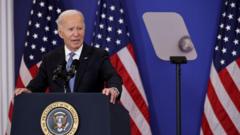In a move that signals potential thawing of relations, President Biden will remove Cuba from the U.S. terrorism list, leading to a prisoner release agreement.
US to Remove Cuba from Terrorism List, Paving Way for Prisoner Release

US to Remove Cuba from Terrorism List, Paving Way for Prisoner Release
US President Joe Biden's administration announces Cuba's removal from the state sponsors of terrorism list, signaling possible progress in relations.
In a significant foreign policy shift, President Joe Biden's administration is set to remove Cuba from its list of state sponsors of terrorism as part of a deal that aims to facilitate the release of political prisoners. This step comes after former President Trump reinstated the designation in the waning days of his administration, which had severe implications for Cuba’s economy.
In a statement, a Biden administration official emphasized that a recent evaluation found "no information" supporting Cuba's classification as a state sponsor of terrorism, adding that the reassessment reflects a more nuanced understanding of the current situation.
Cuba's government responded positively, calling this decision "a step in the right direction" despite its limited scope. The Cuban Ministry of Foreign Affairs asserted that the removal of this designation would alleviate some of the "serious damage" inflicted upon the economy and its citizens by the previous policies.
The administration’s goal is to spur the release of demonstrators who were imprisoned following large-scale protests in Cuba in 2021, triggered by the nation’s dire economic circumstances. A White House official indicated that a "significant" number of prisoners would be freed "in short order" thanks to a deal brokered with the support of the Catholic Church.
Cuba was previously removed from the terrorism list in 2015 during President Obama’s administration. Trump's reinstatement of the designation was justified by claims of Cuba's support for Venezuelan President Nicolas Maduro, a move that was sharply criticized by the Cuban authorities at the time.
As part of this new initiative, Biden plans to notify Congress of additional measures aimed at relaxing financial restrictions placed on certain Cuban individuals and suspending claims to confiscated property in Cuba.
The long-term implications of this decision could extend beyond prisoner releases; it may serve as a catalyst for normalized relations and discussions on broader issues between the two nations. However, moving forward, uncertainty remains regarding potential policy reversals if Trump regains power and the influence of his nomination for Secretary of State, Marco Rubio, who has voiced strong support for sanctions against Cuba.






















